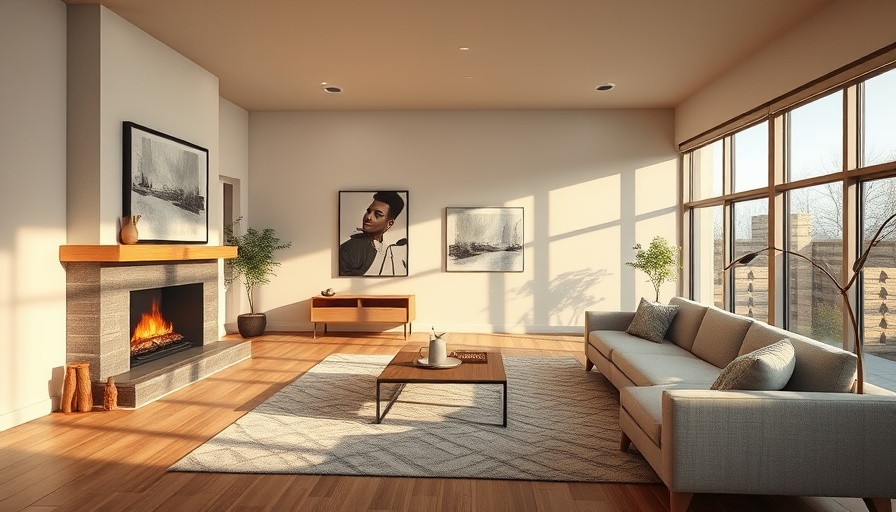
Unlocking Potential: The Dream of Buying a Fixer-Upper
Many homebuyers find themselves captivated by the idea of buying a fixer-upper. A fixer-upper isn't just a house in need of repairs; it's an opportunity to create a home tailored to your personal style while potentially increasing its value. But before you dive in, it's essential to consider both the pros and cons of purchasing a home that requires work.
What Makes a Fixer-Upper Different?
At its core, a fixer-upper is a property that demands investment in repairs that can vary from minor cosmetic updates to major structural renovations. These homes typically come with a lower price point compared to move-in ready properties, allowing buyers the chance to invest in their ideal living space.
Advantages of a Fixer-Upper
Lower Purchase Prices: One of the most compelling reasons to consider a fixer-upper is the lower initial cost. Many listing sites like Redfin or Zillow feature these properties at prices significantly lower than their contemporaries, making them attractive for first-time buyers or those on a budget. This affordability can lead to a reduced down payment and extra funds for renovations.
Customization Opportunities: Imagine designing your dream kitchen or bathroom from scratch. When you buy a fixer-upper, you have the creative freedom to dictate what your space looks like, ensuring that it reflects your personality and style.
Equity Growth Potential: Renovations can enhance a home's value, turning a modest investment into a lucrative return. By purchasing a property at a lower price and making calculated improvements, homeowners may see significant gains when it's time to sell.
Less Buyer Competition: Fixer-uppers often attract fewer bidders, which can simplify negotiations. In a competitive real estate market, having an edge can be incredibly beneficial.
Drawbacks to Consider
Unexpected Costs: While attractive, fixer-uppers can be riddled with unforeseen expenses. Issues like structural damage, outdated utilities, or pest infestations may arise, transforming a budgeted renovation into a financial burden. Assessing these potential risks before proceeding is crucial.
Time Commitment: Renovating a home isn't just about money; it requires significant time and planning. Depending on the repairs needed, living in a home during renovations may not be feasible, often leading to delays and additional stress.
Need for Specialized Skills: Complications can arise if the buyer lacks construction skills. Hiring contractors to execute repairs can quickly erase any savings gained from the property’s lower purchase price.
The Steps to Buy a Fixer-Upper
If you've decided that a fixer-upper suits your dreams, the next step is to understand how to purchase wisely:
- Step 1: Define Your Goals: Determine what renovations you’re prepared to tackle.
- Step 2: Set a Budget: Factor in all costs, including purchase price, renovations, and unexpected expenses.
- Step 3: Find the Right Property: Use resources like Trulia or real estate agents to find listings that fit your criteria.
- Step 4: Assess the Property: Thorough pre-purchase inspections can help identify potential costly repairs.
- Step 5: Secure Financing: Explore different loan options tailored for fixer-uppers, such as FHA 203(k) loans.
- Step 6: Make an Offer: Work with a knowledgeable real estate agent familiar with the fixer-upper market.
- Step 7: Begin Renovations: Lastly, embark on your renovation journey, keeping your budget and timeline in mind.
Funding Your Fixer-Upper Dream
When it comes to financing, traditional loans may not always cut it. Consider options like renovation loans or refinancing programs that allow you to convert a portion of the projected home value into funds for renovations. Understanding the various financing avenues available is essential, and consulting with a financial advisor can illuminate the best options for your situation.
Common Misconceptions About Fixer-Uppers
Many view fixer-uppers as merely cheap homes needing repairs. However, they can also represent a valuable investment opportunity, especially in markets where new construction homes are scarce. It's crucial to reframe how we think about these properties and embrace the potential they offer.
In summary, while purchasing a fixer-upper can seem daunting, thorough research, proper budgeting, and foresight can turn this endeavor into an enriching journey. Whether you dream of designing a picture-perfect kitchen or simply wish to invest wisely in the real estate market, a fixer-upper could be your gateway.
Ready to take the next step? Start your house hunting journey today and explore options with trusted real estate websites like Redfin and Zillow!
 Add Row
Add Row  Add
Add 



Write A Comment